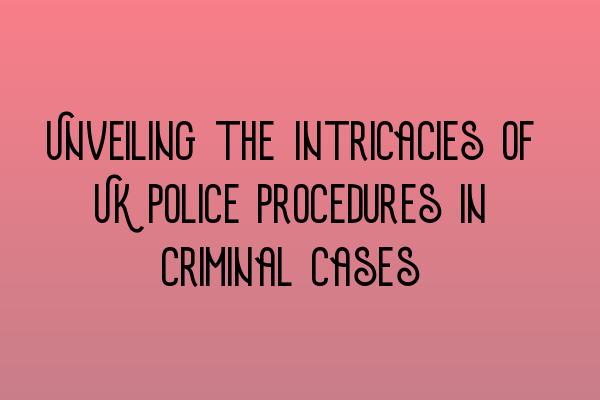Unveiling the Intricacies of UK Police Procedures in Criminal Cases
Welcome to our blog at SQE Criminal Law & Practice Law UK! In today’s post, we will be diving into the depths of UK police procedures in criminal cases, unveiling the intricate workings that ensure the proper handling of crime investigations. Understanding these procedures is crucial for both aspiring lawyers and individuals seeking justice within the legal system.
The Initial Stages of a Criminal Investigation
The UK police follow a structured framework when handling criminal cases. It all begins with the receipt of a crime report, either from a victim or a witness. This report initiates the subsequent steps in the investigative process.
The first stage involves gathering evidence and conducting interviews with the parties involved. It is essential that accurate and comprehensive information is gathered to ensure a fair and just resolution to the case. This process helps establish the foundation for the subsequent stages of the investigation.
Once the evidence has been collected, the police move on to the next phase – the examination of evidence. This entails analyzing and evaluating the collected evidence to determine its relevance and admissibility in court proceedings. To learn more about evidence examination, you can check out our related article on SQE 2 preparation courses.
Arrest and Detention
If the gathered evidence points towards a particular suspect, the police may proceed with an arrest. An arrest allows the police to detain the individual for questioning and further investigation. However, it is crucial to note that an arrest should be based on reasonable grounds and in adherence to legal guidelines.
During the detention period, individuals have certain rights that must be respected. The police should inform the arrested individual about the reasons behind their arrest and their right to legal representation. Understanding these rights and processes can greatly impact the outcome of a case. For SQE 1 exam practice questions related to arrests and detention, you can access our SQE 1 practice exam questions article.
Investigation Continuation and Disclosure
As the investigation progresses, the police may need to conduct further inquiries and gather additional evidence. This may involve interviewing additional witnesses, analyzing forensic evidence, and exploring any potential leads that may arise.
Once the investigation reaches a certain stage, the police are required to disclose relevant information and evidence to the defense. This process, known as disclosure, ensures that both the prosecution and defense are aware of the evidence being presented. For more information on disclosure and its importance, you can refer to our article on SQE 1 practice mocks FLK1 FLK2.
The Role of Legal Professionals
Throughout the entire process, legal professionals play a crucial role in ensuring that the rights of individuals are protected and that justice is served. Lawyers representing both the prosecution and defense work diligently to prepare their cases and present them in court.
For aspiring lawyers, it is essential to have a deep understanding of UK police procedures in criminal cases. This knowledge forms the basis for effectively representing clients and advocating for their rights. To enhance your understanding of the legal system and prepare for the required exams, explore our SQE 1 preparation courses tailored to your needs.
Conclusion
Unveiling the intricacies of UK police procedures in criminal cases is essential for anyone involved in the legal system. Understanding the initial stages of investigation, the arrest and detention process, the continuation of the investigation, disclosure, and the role of legal professionals provides a comprehensive view of how criminal cases progress.
At SQE Criminal Law & Practice Law UK, we strive to provide you with valuable insights and resources to enhance your legal knowledge. Stay tuned for more informative articles, and if you have any specific topics you’d like us to cover, feel free to reach out. To stay updated on the latest SRA SQE exam dates, visit our article on SRA SQE exam dates.
